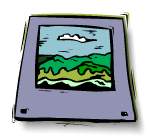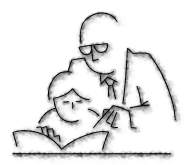- "Have no fear of atomic energy,
- For none of them can stop the time"
- Bob Marley, "Redemption Songs"
-
- "Here at home we'll play in the city
- Powered by the sun
- Perfect weather for a streamlined world
- There'll be spandex jackets one for everyone"
- Donald Fagen, "I.G.Y." (International Geophysical Year)
 How
much do you expect from the future? Depending on some combination of your
innate psychological disposition, your willingness to embrace the new,
and your gullibility, you may either feel threatened or encouraged by current
trends in the information age. Dedicated readers of "Wired" magazine
consistently con themselves into believing that a new breed of person is
just around the corner. Everybody will have equal access to information
and equal voices in constructing the reality of their world. In this brave
new world, the "hive mentality" of the group will replace the
divisive sectarian fragmentation which is so counterproductive to a cohesive
society. Log on to any Internet newsgroup, however, and you'll find more
of the same bigotry and bad logic which already plagues political discourse
in this country. If religion is the opiate of the masses, connectivity
is the opiate of the nerds. How
much do you expect from the future? Depending on some combination of your
innate psychological disposition, your willingness to embrace the new,
and your gullibility, you may either feel threatened or encouraged by current
trends in the information age. Dedicated readers of "Wired" magazine
consistently con themselves into believing that a new breed of person is
just around the corner. Everybody will have equal access to information
and equal voices in constructing the reality of their world. In this brave
new world, the "hive mentality" of the group will replace the
divisive sectarian fragmentation which is so counterproductive to a cohesive
society. Log on to any Internet newsgroup, however, and you'll find more
of the same bigotry and bad logic which already plagues political discourse
in this country. If religion is the opiate of the masses, connectivity
is the opiate of the nerds.
Some educators are expecting so much from "technology",
as we have affectionately come to call that lumpen collection of voice,
data and communication tools currently being implemented in our schools,
that they have actually started to believe the hype of software promoters
who tell them how each new package will  somehow
revolutionize learning and magically provide new meaning to old subjects.
Yeah, right. I think that's what the Encyclopedia Britannica salesman tried
to tell my dad, thirty years ago, just before he got his foot slammed in
the door. The salesman's modus operandi involved the spreading of thick
slabs of guilt trip over the parental slice of hope for the child's success:
buy the encyclopedia or your son/daughter will be the only functionally
illiterate kid on the block. This elegant source of information was sold
as a tool absolutely essential to the intellectual success of the aspiring
student. How many parents bought in to this expensive notion, then failed
to foster any dialogue with their kids or provide any example of love of
learning themselves? somehow
revolutionize learning and magically provide new meaning to old subjects.
Yeah, right. I think that's what the Encyclopedia Britannica salesman tried
to tell my dad, thirty years ago, just before he got his foot slammed in
the door. The salesman's modus operandi involved the spreading of thick
slabs of guilt trip over the parental slice of hope for the child's success:
buy the encyclopedia or your son/daughter will be the only functionally
illiterate kid on the block. This elegant source of information was sold
as a tool absolutely essential to the intellectual success of the aspiring
student. How many parents bought in to this expensive notion, then failed
to foster any dialogue with their kids or provide any example of love of
learning themselves?
Times change. Nowadays parents try to provide computers
for their kids. This is still an expensive proposition, and there is still
no guarantee that the computer will, in and of itself, ensure academic
success. It seems however that the current predilection for jazzy software
is even more driven by self deception on the part of the educators: if
I have this software my curriculum will be complete and life will be easier.
Hah! We need to make a distinction between entertainment, information and
knowledge. The encyclopedia provided tons of information. Technology is
good at providing entertainment along with (and often in place of) information,
but the construction of knowledge comes from communication between living,
breathing people.
No, no - I' m not a Luddite, so don't jump to conclusions.
I love this "technology" stuff probably more than anybody else.
But I'm a lot more interested in the day to day contact with kids, and
the magic that arises from genuine face-to-face communication. The way
to evaluate anything technology-related is to ask yourself whether it brings
the teacher closer to the student and the students closer to each other. If it doesn't, or if
your first and deepest reaction to the software is, "Well I'll be
darned! Isn't that neat," then you don't need it. It's just shallow
entertainment. And if you think any one of these things is there primarily
to make your life easier, that's also the wrong reason to use it - wrong
also in an absolute sense, because computers don't necessarily make your
life any easier, they only make it potentially more interesting.
Remember, there's a difference between easy and interesting. Even the "interesting"
part isn't guaranteed; as with any other tool, it depends on how you use
the computer.
the student and the students closer to each other. If it doesn't, or if
your first and deepest reaction to the software is, "Well I'll be
darned! Isn't that neat," then you don't need it. It's just shallow
entertainment. And if you think any one of these things is there primarily
to make your life easier, that's also the wrong reason to use it - wrong
also in an absolute sense, because computers don't necessarily make your
life any easier, they only make it potentially more interesting.
Remember, there's a difference between easy and interesting. Even the "interesting"
part isn't guaranteed; as with any other tool, it depends on how you use
the computer.
One of the neatest and least remembered beauties of a
computer is still the ease with which we can capture words from our heads
and put them on the screen. It's the ability to let your fingers do the
thinking for you - the freedom to write unrelated words or phrases anywhere
on the page, any time, and to pick them up and move them around later,
without having to erase and rewrite. The threshold of frustration is lowered,
and communication is enhanced. I say this is a super good thing, because
it is a way to help help construct meaning out of chaos. That's one reason
 why I'm a big fan of computers. Although this ability to compose in a completely
different manner has been duly noted elsewhere, because it lacks the bells
and whistles of some of the more high powered and visually glitzy stuff,
we tend to forget what a great tool we have at our disposal. why I'm a big fan of computers. Although this ability to compose in a completely
different manner has been duly noted elsewhere, because it lacks the bells
and whistles of some of the more high powered and visually glitzy stuff,
we tend to forget what a great tool we have at our disposal.
As educators, however, we are constantly reminded not
to treat the computer as a mere typewriter. It's very important to remember
that there are vastly more powerful uses for the machine. But really, I
must stress again that it's all how you use a tool that determines its
effectiveness. The old, jaded "country report" (you know - "The
primary export of Mauritius is bauxite.." etc.) can be just as stale
and meaningless when done through, say, PowerPoint as it ever was before
the invention of presentation software. In fact, it can be worse! We may
actually end up trading in some of the writing, thinking and organization
skills required for the old written report for the visual and entertainment
appeal of the presentation software. It all depends how you use it. If
you ask for more than canned information from students you will get it,
but you won't necessarily get it just by virtue of using showy software.
If we want to escape the old recall methodology of teaching
(and we do, don't we? .....DON'T WE!?) then we must be just as vigilant
of how we use the new technology as we were about not letting kids turn
in vast quantities of slightly modified information on Mauritius and calling
it original thinking. Information is merely the raw material of knowledge
and understanding. Original thinking (or the construction of knowledge)
requires that the student make new connections and discover new insights,
and "technology", purely by virtue of its newness, does not necessarily
guarantee that new and original insights will be made. Once again, it's
a matter of personal intervention. We cannot allow the technology to babysit
for us and then fool ourselves into believing that something useful is
going on. The teacher is still the most important "tool" in the
classroom, and it will be a heck of a long time before that ever changes.
Would you let television take over the parenting of your
kids? Well, O.K., maybe it's actually going on, as a matter of fact, in
millions of homes across the nation. Which is why many progressive thinking
parents simply ban the T.V. from their homes. Not a bad idea, but perhaps
somewhat drastic. It seems that people who don't have a television in their
home are forever prattling on about how wonderful and virtuous a life they
lead. Like a recovering alcoholic, or a smoker who has managed to quit,
they have turned their backs on the substance, in this case television,
and are leading more productive lives for it. Great, but please, leave
me out of it! I can "parent" my kids just fine AND watch television
from time to time. Likewise, I can live with and use the "technology"
without becoming so lazy that I let it do my job for me, because I think
I still realize that a teacher's job, like that of a parent, is actually
so important that it should not be handed over to a machine, or even an
encyclopedia. We are still the single most influential factor in our kids'
lives, and we would do well to remember how insignificant computers are
in comparison to the power of direct, one-on-one, compassionate, dedicated
involvement in the lives of those we care for.
 As
educators and parents our healthy fear of the Internet arises directly
out of our sense that, like television, it is both powerful and impersonal.
The Internet is the most talked about and least understood of the technology
features in our schools. It is just like the real world, only more so.
There's more than you can ever use - entertainment and information, not
knowledge - and it's more extremely specialized, and available than you
would ever want. So you have to select. And you have to guide. And you
have to be there, in the room, when it is in use, just like before, only
more so. Pornography is not the big problem with the Internet. That's just
a side issue, drummed up out of all proportion to its significance to sell
copies of TIME magazine. The more important issue regarding students' use
of the web is training them to evaluate the myriad sources of conflicting
information which will become available to them at the push of a button.
Now here's an issue I can sink my teeth into, because my involvement is
required. As
educators and parents our healthy fear of the Internet arises directly
out of our sense that, like television, it is both powerful and impersonal.
The Internet is the most talked about and least understood of the technology
features in our schools. It is just like the real world, only more so.
There's more than you can ever use - entertainment and information, not
knowledge - and it's more extremely specialized, and available than you
would ever want. So you have to select. And you have to guide. And you
have to be there, in the room, when it is in use, just like before, only
more so. Pornography is not the big problem with the Internet. That's just
a side issue, drummed up out of all proportion to its significance to sell
copies of TIME magazine. The more important issue regarding students' use
of the web is training them to evaluate the myriad sources of conflicting
information which will become available to them at the push of a button.
Now here's an issue I can sink my teeth into, because my involvement is
required.
Training students to question and critically regard every
word that appears in print, be it mainstream media or crackpot newsgroup
postings, requires intelligent teacher intervention. Here's a real job
for a real person, one that I will never relinquish to a machine, because
the machine - in this case the World Wide Web - is only as good as the
person operating it. My job as an educator is training students to "access"
information and, more importantly, evaluate information. So when one of
my students is doing a report on, say, the national health care debate,
and finds tons of "good" information posted by the American Medical
Association's homepage, telling why "socialized" medicine is
bad, I can at least attempt to show why the A.M.A. would be expected to
post such info, and can suggest getting a second opinion on the subject,
in good medical tradition. Far from discounting evidence, I am  asking
students to check their sources, question motives, and think for themselves.
These are lofty objectives, and the use of the Internet to access all kinds
of information only enhances my ability to teach the important lessons
of the need for an educated populace in a healthy democracy. asking
students to check their sources, question motives, and think for themselves.
These are lofty objectives, and the use of the Internet to access all kinds
of information only enhances my ability to teach the important lessons
of the need for an educated populace in a healthy democracy.
Nowadays we are bombarded with non-stop "news",
so that it becomes increasingly difficult to know what is important, or
even true. "The flow of messages from the instant everywhere fills
every niche of our consciousness, crowding out knowledge and understanding.
For while knowledge is steady and cumulative, information is random and
miscelllaneous" (Daniel Boorstin). I welcome the advent of the age
of information, despite its drawbacks, not because of some inherent qualitative
difference in the texture of human experience which is promised
by our access to information, but because it at least offers a chance that
the quality of our thought and communication might be enhanced
through unrestricted access to information. What we do with that information
is the challenge, and how we teach our children the difference between
entertainment, information and knowledge is still our responsibility. |








